Internal Medicine Residency: What Sets BIDMC Apart
Camaraderie, Innovation, Academic Rigor
When asked what makes this program special, the resounding answer from our house staff is "the heart and camaraderie of the program." The workplace and learning environment is supportive, collegial and fun. Residency should not be about simply surviving but, rather, thriving professionally and personally. Residents truly enjoy their years at BIDMC and graduate with not only outstanding clinical and academic expertise but also a network of professional colleagues and friends.
It's not only the amazing clinical training that sets BIDMC apart, but also my fellow co-residents. They are not just co-workers. They are real friends.Current Resident
BIDMC aims to provide each resident with a well-rounded educational and clinical experience. We take pride in exposing residents to ample research opportunities, quality improvement and patient safety innovation, as well as exceptional mentorship from world-class generalists and subspecialists. The program directors, faculty advisors, and chief medical residents work to create an educational environment that is flexible - one that can cater to individual intellectual curiosity and enable each resident the opportunity to carve out a personal clinical, educational and research path.
BIDMC's unique program in medical resident training merited its selection as one of an initial group of 17 internal medicine residency programs nationwide to be enrolled in the Education Innovations Project, sponsored by the ACGME/Residency Review Committee in Internal Medicine. In addition to our mission of graduating residents to be outstanding clinicians, exemplary educators, and premier researchers, we have created an innovative educational infrastructure to ensure that our residents attain the requisite knowledge, skills, attitudes, and hands-on experience to serve as expert health system leaders wherever their future practice may take them.
Alternating Call and Elective Scheduling (ACES)
Most programs require residents to attend ambulatory continuity clinics while on inpatient rotations such as the medical wards. Unfortunately, this can create a stressful environment that can potentially compromise learning and patient care in both the inpatient and outpatient settings. To address this, we created a novel model of Alternating Call and Elective Scheduling (ACES) that separates resident inpatient clinical responsibilities from outpatient continuity care. As a result of this redesign, residents felt the new structure minimized conflict between inpatient and outpatient duties and preserved a longitudinal relationship with continuity patients.
Medical Firms
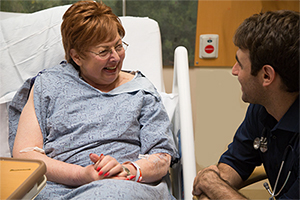 Over 25 years ago Beth Israel Deaconess Medical Center created a novel teaching, learning and patient care environment in the form of our medical firm system. At the time, BIDMC was one of the first institutions in the country to create and utilize such a firm structure. Each house officer is assigned to a firm for the duration of their training. The Firm is led by a Firm Chief, Associate Firm Chief, and Chief Medical Resident; this group organizes teaching on the Firm, social events, and provides mentorship and feedback. The Firms each have geographical homes on the wards. When on a general medicine ward rotation, a house officer will always go to the same floor — work with the same nurses, case managers, and staff — under the direction of the Firm leadership. They will work with other residents and interns on the same Firm, and each week they will go to Firm Conference, led by the Firm Chief and Associate Firm Chief. In this way, a smaller group of residents and housestaff get to know each other very well. On all other rotations (ambulatory, ICU, cardiology, oncology, electives, etc.), residents work with any other resident from the entire residency — you get to know everyone in the program. Throughout the year, Firm leadership is available to serve as mentors and advisors, and also arrange formal, individual meetings several times a year.
Over 25 years ago Beth Israel Deaconess Medical Center created a novel teaching, learning and patient care environment in the form of our medical firm system. At the time, BIDMC was one of the first institutions in the country to create and utilize such a firm structure. Each house officer is assigned to a firm for the duration of their training. The Firm is led by a Firm Chief, Associate Firm Chief, and Chief Medical Resident; this group organizes teaching on the Firm, social events, and provides mentorship and feedback. The Firms each have geographical homes on the wards. When on a general medicine ward rotation, a house officer will always go to the same floor — work with the same nurses, case managers, and staff — under the direction of the Firm leadership. They will work with other residents and interns on the same Firm, and each week they will go to Firm Conference, led by the Firm Chief and Associate Firm Chief. In this way, a smaller group of residents and housestaff get to know each other very well. On all other rotations (ambulatory, ICU, cardiology, oncology, electives, etc.), residents work with any other resident from the entire residency — you get to know everyone in the program. Throughout the year, Firm leadership is available to serve as mentors and advisors, and also arrange formal, individual meetings several times a year.
Intern Orientation Program
Our novel Intern Orientation Program (IOP) was created to help interns to adjust to structure and systems of their new role, especially in their ambulatory clinics. This orientation is designed to help interns, who often having variable experience in primary care during medical school, rapidly acclimate to the outpatient setting. At the beginning of the first year, all interns begin with two weeks of either ambulatory rotation or inpatient wards, and then switch places after two weeks. During their time in the ambulatory IOP, interns are oriented to their specific clinic site and have half-day patient care sessions 3-4 times per week. They are also provided with didactic lectures on common outpatient clinical and systems topics. The IOP experience has been highly reviewed by both our interns and faculty.
Ambulatory Long Block (Primary Care Track)
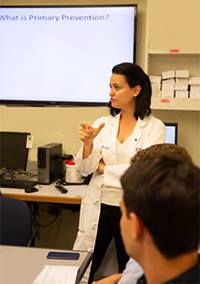 Primary Care Track is designed to increase continuous time spent in the ambulatory setting and teach residents about innovations in primary care by allowing residents to spend 6 consecutive months in the outpatient setting during their junior and senior years. In addition, residents participate in unique projects focused on practice redesign and quality improvement, and receive leadership training focused on the primary care experience.
Primary Care Track is designed to increase continuous time spent in the ambulatory setting and teach residents about innovations in primary care by allowing residents to spend 6 consecutive months in the outpatient setting during their junior and senior years. In addition, residents participate in unique projects focused on practice redesign and quality improvement, and receive leadership training focused on the primary care experience.
Stoneman Elective in Quality Improvement and Patient Safety
The BIDMC Internal Medicine residency program has been a national leader in quality improvement for over a decade. We practice in a hospital and department that values the highest quality care and consistently desires to do better. QI and safety training have been part of the BIDMC core curriculum since 2001. Here at BIDMC, QI is emphasized from day one of orientation and is interwoven throughout the three years of residency. In the junior and senior years, all residents complete the Stoneman Elective under the mentorship of our Patient Safety Core Faculty. With such a strong QI foundation, several BIDMC graduates have successfully gone on to pursue careers in quality improvement and innovation nationwide.
"Residents as Teachers:" The Clinician Educator Track
BIDMC recognizes the importance of comprehensive medical education in the training of its house officers. Residents in the program are not only encouraged to be active learners but also effective and highly skilled teachers. The Clinician Educator Track provides interested residents a unique opportunity to develop the skills necessary to become a leader in medical education. Categorical residents who wish to participate apply for a position during their intern year. If accepted into the track, they participate in a comprehensive longitudinal curriculum that will extend through the last two and a half years of your residency training and include focused didactic sessions and the opportunity to complete a medical education research project. All residents at BIDMC will become great teachers; the CET is for interested residents who want to make medical education a major part of their academic careers.
Senior Teacher
During the third year of residency, residents may select an elective called "Senior Teacher." During this three week block, residents not only lead didactic lectures for medical student and interns but also precept interns in the Health Care Associates Primary Care Clinic. This rotation allows residents the experience to teach and guide junior learners as well as refine their own teaching skills.
Fundamentals of Medical Education Course
For a week every year, interested residents who are not in the Clinician Educator Track can take an intensive medical education elective, reviewing concepts in Adult and Cognitive Learning theory, and practice teaching in a controlled environment with Master Educator mentors.
Mount Desert Island
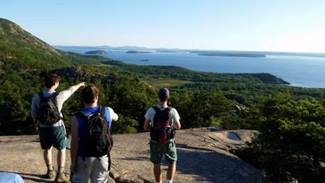
Each year a group of junior and senior residents travel to the beautiful Maine coast for a 1-week basic science immersion experience in comparative physiology.
The goals of the course are to increase appreciation for physiology and enhance incorporation of basic pathophysiology into teaching and clinical roles on the general medical ward and ICU rotations. The course, held at Mount Desert Island Biologic Laboratories, is comprised of multiple modules (for example, water metabolism, NaCl excretion, hematology/coagulation, cardiovascular physiology), each with basic science experiments utilizing aquatic species, and accompanied by clinical correlation discussions. After each module, residents present their findings to one another, with specific aims for subsequent groups to investigate. Beyond the laboratory experience, residents are encouraged to enjoy all the Maine coastline has to offer, including rock climbing and kayaking.
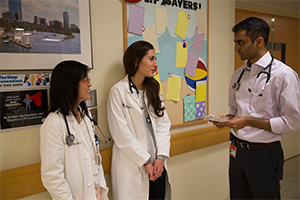 In traditional residency education most learners participate in a uniform program dictated by their residency. Such a uniform program can provide a core educational curriculum, but does not provide residents an opportunity to identify and participate in advanced educational and career development that can help residents accelerate their career trajectory along one of many diversifying career paths of internal medicine.
In traditional residency education most learners participate in a uniform program dictated by their residency. Such a uniform program can provide a core educational curriculum, but does not provide residents an opportunity to identify and participate in advanced educational and career development that can help residents accelerate their career trajectory along one of many diversifying career paths of internal medicine.
Thus, we have created a series of learner-centered tracks, pathways and supplemental educational experiences that complement our core educational curriculum, allowing learners to identify and participate in advanced educational and career development programs.
We offer interns the opportunity to apply to one of four formal tracks:
In addition, comprehensive supplemental pathways in Research and Quality Improvement exist for all residents.
The Research Course
In addition to the Physician-Scientist Track, the program offers a Research Course to junior and senior residents. The Research Course is a two-week introduction to research methods and resources, grant and paper writing, and career development. Residents develop a research project in workshops with other residents and faculty mentors, and receive seminars on study design, research methodology, and local research resources. This course has helped many residents become true physician-scientists and physician-researchers. Our program also provides financial support and clinical coverage to attend national conferences.
Area of Concentration
Area of Concentration, also called elective research time, is available to residents interested in pursuing an independent project in basic science or clinical research, medical education, health policy, quality improvement, or general internal medicine. Residents have access to superb clinician-researchers and scientists to help mentor their projects. Residents can review an up-to-date database of previous resident projects and meet with Dr. Mukamal and Dr. Parikh to help get them started.
Residents typically work closely with a mentor from Beth Israel Deaconess Medical Center, the Dana Farber Cancer Institute, the Harvard Clinical Research Institute, or the Boston VA Healthcare System, depending on their area of interest. In the past, residents have had great success transitioning their AOC work into subsequent publications and presentations at national meetings. At the end of the year, all residents participating in AOC present their work at a resident research night, which is open to all Beth Israel Deaconess house staff and faculty. A list of titles of resident research projects can be found here.
Internal Medicine Global Health Program
Residents passionate about global health and future careers in the fields of international health, public policy and global health research are encouraged to participate in the Global Health Track. Participants in the Global Health Track are enrolled in the prestigious Global Health Effectiveness Program at the Harvard School of Public Health; they participate in our hospital-wide, year-long global health curriculum and journal club, and have the opportunity for two extended field experiences abroad during residency.
Quality Improvement
The BIDMC Internal Medicine residency program has been a national leader in quality improvement for over a decade. We practice in a hospital and department that values the highest quality care and consistently desires to do better. QI and safety training have been part of the BIDMC core curriculum since 2001. In the junior and senior years, all residents complete the Stoneman Elective under the mentorship of our Patient Safety Core Faculty. These residents participate in ongoing safety and quality activities at the institutional and departmental levels, perform root cause analyses, and participate in hands on project work.
For residents who want further QI training, we offer a one-week intensive "QI Retreat." A dozen residents each year participate in this multidisciplinary course that teaches advanced QI skills through analysis, design, and improvement of a multidisciplinary project. Many residents do additional scholarly QI work through our comprehensive research pathway and opportunities as described elsewhere.
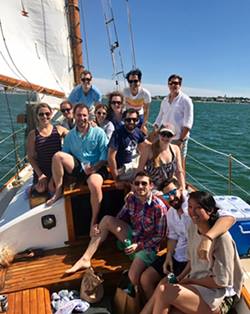 Maintaining healthy levels of work-life balance and a positive mental mindset can often be a challenge in residency training in the United States. At BIDMC, we pride ourselves in creating a happy, supportive environment where residents can thrive professionally, academically, and personally.
Maintaining healthy levels of work-life balance and a positive mental mindset can often be a challenge in residency training in the United States. At BIDMC, we pride ourselves in creating a happy, supportive environment where residents can thrive professionally, academically, and personally.
We have a number of programs in place to support residents’ wellness. For example, this year all residents were given tickets to attend the Boston Symphony Orchestra. In addition, we carve out protected time for wellness afternoons, yoga and guided meditation.
Peer Support
A hospital-wide program that provides extra training to resident peers to provide support for such issues as identifying resources for coping with stress, processing stressful situations, and whatever else may be helpful to colleagues. Big/Little Sibs Program: An idea brought about by two recent residents, this program matches incoming interns with a junior or senior resident based on similar occupational and extracurricular interests. Our big sibs serve as mentors and guides throughout the very first days of internship and beyond.
Opportunities Unique to Internship
Intern Forum: Each month small firm based groups of interns meet over lunch with a dedicated group of nurses and social workers; these sessions create a relaxing and safe environment for interns to reflect on and share their experiences. Intern Retreats: In the fall of Intern year, all of the interns go off-campus for an overnight retreat in a beautiful ocean-front setting. The retreat is a time to bond with colleagues and faculty and to reflect on their experiences. In the spring we hold a day-long retreat to prepare for interns for the transition to their role as residents and team leaders. The retreat is capped by an end of year celebration for interns.
Flex Days
Housestaff have several Flex Days that can be used throughout internship and residency to enable them to make it to important family events, doctor's appointments, etc.
Fellowship Interview Support
When residents are applying to fellowship or interviewing for jobs, the Chief Medical Residents play a very active role in getting them coverage and making sure they can get to interviews without excessive struggle. We are one of the few residency programs nationwide to offer this and it saves our residents many hours of finagling their schedules.
Social Events
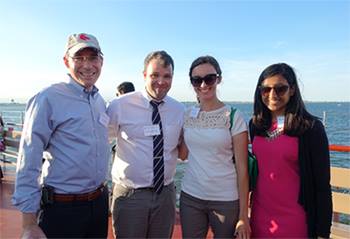 BIDMC residents work hard! We do not allow the year to pass without celebrating the passage of time, holidays and accomplishments. Interns begin their year a tour of the Boston Harbor aboard a harbor cruise-ship. An annual holiday party is held for all housestaff in December where hospital-wide overnight coverage is provided by recent BIDMC graduates who remain in the Boston area. At the end of the year the interns are treated to the Sidel Dinner at the Harvard Club to mark their accomplishment and bid farewell to their preliminary-intern colleagues as they move on to their specialty residency programs. Senior residents are similarly celebrated with graduation events prior to moving on to fellowships, research positions and practice.
BIDMC residents work hard! We do not allow the year to pass without celebrating the passage of time, holidays and accomplishments. Interns begin their year a tour of the Boston Harbor aboard a harbor cruise-ship. An annual holiday party is held for all housestaff in December where hospital-wide overnight coverage is provided by recent BIDMC graduates who remain in the Boston area. At the end of the year the interns are treated to the Sidel Dinner at the Harvard Club to mark their accomplishment and bid farewell to their preliminary-intern colleagues as they move on to their specialty residency programs. Senior residents are similarly celebrated with graduation events prior to moving on to fellowships, research positions and practice.
BIDMC Residency Adventures
Residency requires balance and maintaining a healthy mindset and healthy lifestyle. The Chief Residents thus organize Residency Adventures, which include several active events around the Boston area. Prior events include a bike ride through the historical Minuteman national parkway, several 5K runs, a rock climbing night, and Downhill and Cross-country ski days. The Residency leadership generously supports these healthy and fun endeavors.
